
Green Practices: Enhancing Sustainability in Demolition Services
Sustainability is now a need in the quickly changing world of building, not a choice. Demolition services are also taking action to change the globe as it moves toward more environmentally friendly options. Welcome to the world of green practices, where cutting-edge, eco-friendly methods have taken the place of conventional wrecking balls.
A brighter future is made possible by sustainable demolition, which not only preserves natural resources but also drastically lessens its negative effects on the environment. Demolition services are revolutionizing the business from the bottom up by embracing recycling, reusing resources, and reducing waste. Explore our in-depth guide to learn how these eco-friendly methods are changing the demolition industry, one project at a time.
OUR SERVICES
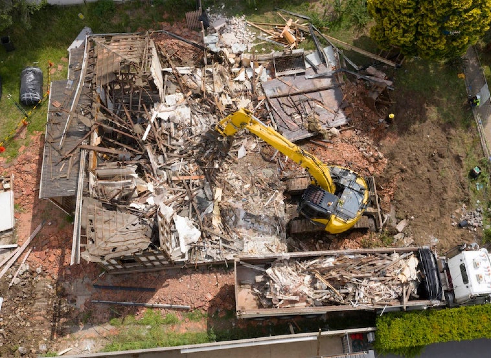
Structure Demolition. Residential, Commercial & Industrial
If your structure poses a health, safety, or environmental risk, demolition can prevent costly citations or fatal accidents. While this may seem daunting, you are just a phone call away from having your residential demolition done professionally, responsibly, and at a great price.
Talk to a Demolition Specialist Now! 916.249.5001
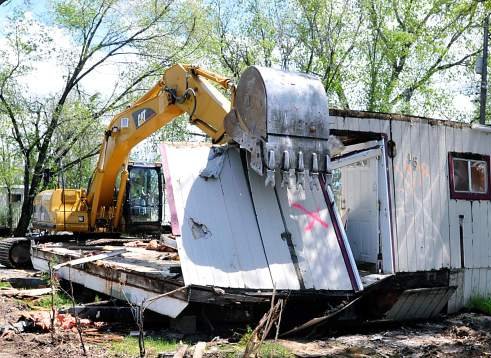
Mobile Home Demolition
We demolish and haul away mobile homes. Any size, anywhere, anyhow. We are fast, clean and competitive. We serve most of Northern California. There are many factors to consider when removing or demolishing your old trailer, mobile home, or manufactured home like: the processes involved, costs, time, contractors, debris, and permits.
Talk to a Demolition Specialist Now! 916.249.5001
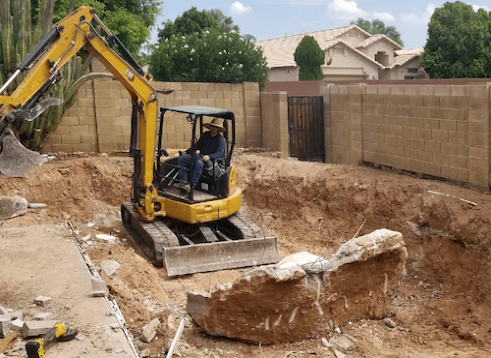
Pool Demolition
When removing a pool in Sacramento, California with the professional demolition team of Maxton Demo, you’re guaranteed peace of mind from beginning to end. From your initial request for an estimate to clean-up, you can expect our pool demolition process that’s completely professional and safe.
Talk to a Demolition Specialist Now! 916.249.5001
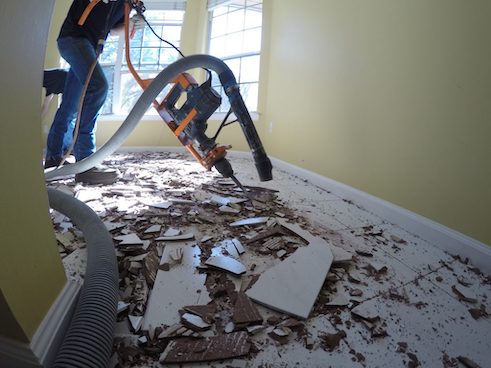
Floor Demolition
Flooring demolition, like any other major home renovation work, requires a specific set of skills and tools to be performed properly. You need experts in flooring demolition to get you the best floors possible. Contact us to find out more about how we can help you today.
Talk to a Demolition Specialist Now! 916.249.5001
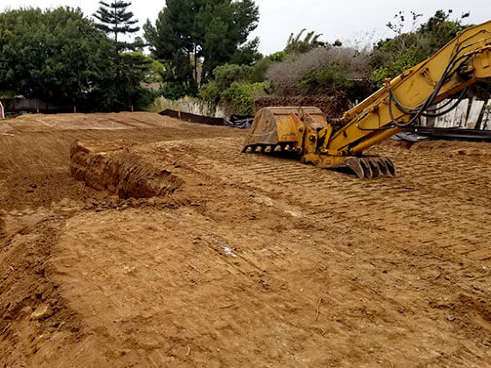
Grading & Excavating
If you need an experienced excavator and grader in Sacramento, call us today. One of the many reasons that residential, commercial, and industrial customers choose to work with us is because we’re able to provide a broad range of services to help construction-related projects get done in less time and at a reduced cost.
Talk to a Demolition Specialist Now! 916.249.5001

Roof Snow Removal
Heavy snow & ice dams can cause significant roof and home damage. Roof Snow removal is our specialty during the winter months. Serving the Sacramento, California area for 10 years, we can get your roof snow removed and promise a quick response and reasonable rates.
Talk to a Demolition Specialist Now! 916.249.5001
Sustainability’s Significance in the Demolition Industry
In the building business, the demolition industry is essential since it makes room for new projects and infrastructure. Traditional demolition techniques, however, have often come under fire for their detrimental effects on the environment, which include substantial trash creation, air pollution, and the depletion of natural resources. As a result, the sector is changing dramatically, with sustainability taking the lead.
Sustainable demolition techniques place an emphasis on resource conservation, emission reduction, and trash minimization in an effort to allay these environmental worries. This change is not only good for the environment, but it also complies with regulatory agencies’ and customers’ increasing requests for green construction methods. As a result, sustainability in demolition is turning into a crucial component of the sector’s development, guaranteeing that it can satisfy present demands without jeopardizing the capacity of future generations to satisfy their own.
The demolition industry’s embrace of green techniques is indicative of a larger commitment to social responsibility and environmental sustainability. Demolition firms may greatly lessen their environmental impact, support the circular economy, and create opportunities for a more sustainable building sector by adopting sustainable practices.
Essential Guidelines for Sustainable Demolition
The three guiding concepts of sustainable demolition are reduce, reuse, and recycle. The industry follows these guidelines to minimize its effect on the environment and maximize the value of resources.
Reduce: Cutting down on trash production is the first step towards sustainable demolition. This may be accomplished by carefully organizing the destruction of buildings and choosing which ones to leave intact so that resources can be recycled or conserved.
Reuse: The foundation of sustainable demolition is the reuse of resources. Demolition businesses may save parts like bricks, beams, and fittings and offer them a second chance at life, which lessens the demand for new materials and conserves resources.
Recycle: Recycling provides a means of recovering the value of materials that are no longer reusable in their original form. Wood, concrete, and metals may all be processed to create new goods, completing the circle and promoting a circular economy.
Green Demolition Methodologies and Innovations
The demolition sector is leading the way in the transition to sustainable practices with innovative methods and technology. Reusing and recycling materials is made possible by controlled demolition techniques like selective dismantlement, which minimize waste by precisely removing building components.
Dust, vibration, and noise are greatly reduced by robotic demolition robots, which can carry out duties with accuracy and efficiency. These devices reduce the environmental impact of conventional demolition techniques while simultaneously increasing safety during demolition operations.
Furthermore, by allowing for the thorough mapping of materials and buildings, Building Information Modeling (BIM) in demolition planning facilitates the identification of recyclable components and improves overall demolition process efficiency.
This introduction explains the steps you may use to continue with the sections on recycling and waste management in demolition, case studies of successful sustainable demolition projects, and so on, following the structure and directions given. As you follow SEO and conversation optimization guidelines, make sure your story is coherent, interesting, and covers every topic in your blueprint.
How to Improve Sustainability in Demolition Services with Safety Measures
Environmentally friendly approaches are revolutionizing the demolition business in an age when sustainability is a necessity rather than an option. Businesses may strike a careful balance between environmental stewardship and operational efficiency by implementing sustainable practices. Join the push towards a more sustainable future by learning the useful advice and creative solutions that are making a new standard in the demolition business.
Safety is Crucial for Sustainable Demolition
Safety is of the utmost importance in demolition, especially when using sustainable approaches. The necessity to reduce the negative effects on the environment adds to the hazards that come with demolishing buildings. Sustainable demolition aims to protect the environment for future generations as well as the health and safety of the workforce and the community. This dual emphasis necessitates reevaluating conventional techniques in favor of more deliberate, environmentally responsible ones.
Global regulatory organizations are realizing how critical sustainability and safety are to demolition. These organizations not only establish strict policies but also monitor them closely, conducting frequent inspections and enforcing fines for noncompliance. The demolition sector is changing as a result of the regulatory environment, which is pushing businesses to give worker safety and environmental preservation equal priority.
Dismantling buildings with the least amount of damage to people and the environment is the challenge. This calls for meticulous planning, the use of eco-friendly technology, and the observance of recommended waste management procedures. Demolition firms may safeguard employees, communities, and the environment by prioritizing sustainability and safety. This comprehensive strategy yields advantages for all parties involved.
Standards and Guidelines for Regulation
An extensive grasp of regional, governmental, and global regulations is necessary to successfully navigate the regulatory framework guiding sustainable demolition. These guidelines are intended to guarantee the safe and environmentally responsible execution of demolition operations. They address a wide range of issues, including the recycling of demolition debris, noise pollution, dust management, and the handling of hazardous chemicals.
Keeping up with the constantly changing regulatory environment is one of the biggest issues facing demolition firms. Since laws may differ greatly across states, it is crucial for firms to be knowledgeable and flexible. In addition to being required by law, compliance shows a company’s dedication to sustainability and safety.
Demolition businesses have to spend money on technology and training in order to comply with these strict regulations. This entails putting in place thorough safety precautions, using green demolition techniques, and training employees on the most recent requirements. Companies may avoid fines and improve their standing as sustainability leaders in their business by aligning their operations with regulatory standards.
Organizing a Sustainable and Safe Demolition
Ensuring the safety and sustainability of demolition operations is contingent upon the planning phase. Businesses examine possible risks, evaluate the effects on the environment, and create risk-reduction plans during this phase. A complete study of the building to be destroyed, including its materials, construction techniques, and any historical value, is essential for effective planning.
The planning process’s cornerstones are risk assessment and hazard identification. Analyzing the possibility of mishaps, including falls, collapses, or contact with dangerous materials, is necessary for this. Assessing environmental hazards, such as contamination of the air and water, is another aspect of it. Early detection of these risks allows businesses to develop focused mitigation plans, such as customized tools for handling hazardous materials safely or dust suppression methods.
Sustainable demolition also involves integrating green demolition techniques into the design stage. This might include deconstruction, which is the methodical disassembly of things for recycling or reuse as opposed to demolition and disposal. Deconstruction planning necessitates a thorough grasp of the materials’ potential for reuse as well as a careful inventory of them. By giving priority to these environmentally friendly activities, businesses may both help the circular economy and drastically lessen their influence on the environment.
Advantages of Using Green Demolition Techniques
Using green demolition techniques has several advantages beyond just protecting the environment. These techniques also enhance public health and safety, have positive economic effects, and promote social well-being.
Sustainable demolition may result in considerable cost reductions from a financial standpoint. Companies might possibly make a profit from the demolition process and offset their costs by rescuing and selling reusable items. Green demolition techniques may also improve a business’s image by drawing in customers who respect sustainability and giving it a greater edge over competitors.
The benefits to the environment are obvious. Sustainable demolition lowers greenhouse gas emissions, preserves natural resources, and minimizes garbage going to landfills. By lowering the chance of exposure to dangerous chemicals and decreasing air and water pollution, these policies improve community health and safety.
Green demolition techniques may benefit society by generating employment in the recycling and material salvage industries. Furthermore, these activities promote a more fair and sustainable economic structure by supporting the circular economy.
Environmental Sustainability’s Significance in the Demolition Industry
The demolition business, which has a reputation for being rough and destructive, is going through a big change. The transition to more environmentally sustainable practices is not only a fad; rather, it is an evolution that is required to lessen the environmental effect of demolition operations. If building demolition is not done with sustainability in mind, it may result in significant waste, emissions, and energy use.
The industry has started to adopt environmentally conscious methods after realizing these effects. This entails employing environmentally friendly demolition techniques, recycling and reusing materials wherever feasible, and careful planning to reduce waste. These methods lessen the carbon footprint of building and demolition operations, in addition to protecting natural resources.
Furthermore, the demolition industry’s focus on sustainability is consistent with a larger social movement in favor of environmental responsibility. Sustainable techniques are becoming more and more in demand across all industries, including demolition, as people become more conscious of climate change and resource depletion. The industry is changing as a result of this change, and in order for businesses to remain relevant and competitive, they must innovate and embrace greener practices.
Environmental Guidelines and Requirements for Demolition in Commercial Settings
The direction of commercial demolition techniques towards sustainability is mostly determined by environmental legislation and standards. In an attempt to reduce their environmental effects, governments and environmental authorities across the globe have created certain standards and regulations that demolition projects must follow. These rules address a number of topics related to demolition, such as recycling and trash management, as well as noise and air quality issues.
For example, a lot of places mandate that demolition contractors provide an extensive waste management plan, including methods for sorting, recycling, and disposing of items. By ensuring that materials like concrete, metal, and wood are recycled or reused instead of ending up in landfills, these programs help to cut down on the amount of virgin resources needed and the greenhouse gas emissions that come with disposing of garbage.
Furthermore, by restricting the discharge of pollutants during demolition, laws pertaining to emissions and air quality also work to preserve the environment and public health. This might include taking steps to manage dangerous substances like asbestos, regulate dust, and lower emissions from demolition machinery. In addition to ensuring that demolition businesses may operate lawfully and stay out of trouble, following these standards also helps safeguard the environment.
Eco-Friendly Methods for Commercial Demolition
In order to implement sustainable practices in commercial demolition, a comprehensive strategy covering the whole project lifetime must be used. There are many chances to include eco-friendly procedures, from the planning phases to the ultimate disposal of materials. The preference for deconstruction over standard demolition, in which buildings are painstakingly disassembled to save as much material as possible for recycling and reuse, is one important component.
This method conserves energy and resources that would otherwise be required to create new construction materials, in addition to reducing the quantity of trash produced. Reclaimed materials, including windows, doors, fittings, and even structural components, may be given new life in future building projects, promoting a circular economy.
Another area where demolition operations may improve sustainability is through energy-efficient machinery and equipment. Demolition businesses may drastically lessen their environmental impact by selecting equipment with reduced fuel consumption and emissions. Furthermore, using methods like water misting to manage dust during demolition may enhance air quality and lessen the effects on neighboring towns.
Environmental Sustainability’s Advantages for Commercial Demolition Services
Beyond the apparent ecological benefits, commercial demolition may reap many other advantages by adopting an environmentally sustainable approach. Sustainable company strategies may result in lower expenses, improved reputations, and a competitive advantage. For instance, by lowering the demand for new materials and disposal expenses, recycling and reusing resources may save project expenditures.
Additionally, businesses that put sustainability first often see an increase in their reputation and draw in customers that respect environmental responsibility. This may lead to new business prospects, especially when dealing with corporate and government customers whose projects may have stringent sustainability requirements. Furthermore, exhibiting a dedication to sustainability may boost staff morale and draw in talent from companies that value the environment.
More broadly, green demolition techniques aid in the reduction of greenhouse gas emissions, the preservation of natural resources, and the facilitation of the shift to a circular economy. Through waste reduction and material reuse and recycling, the demolition sector may contribute significantly to the development of more environmentally friendly building methods in general.
The Commercial Demotion Industry’s Prospects For Environmental Sustainability
Commercial demolition services‘ use of environmental sustainability is changing quickly because of market constraints, legal requirements, and an increasing awareness of the industry’s environmental effects. Sustainability will undoubtedly continue to influence the demolition sector going forward, encouraging businesses to innovate and implement sustainable business methods that benefit the environment and the bottom line.
The future of commercial demolition depends on how well today’s development projects are met while also protecting the environment for coming generations. The demolition sector can help create a more environmentally friendly and sustainable future by adopting sustainable methods, proving that even the most damaging operations can be redesigned to save the environment.
In summary, there is still work to be done in the direction of sustainability in commercial demolition, but the path is obvious. The industry may expand further and make demolition a crucial part of sustainable building and development globally with the appropriate techniques, tools, and mentality.
Considering the broad scope of this subject, more investigation and study of particular technologies, case studies, and creative approaches would be helpful for a thorough grasp of environmental sustainability in commercial demolition services.
Do you have a Question?
Talk to a Demolition Specialist Now! 916.249.5001
Request Formal Quote